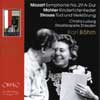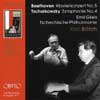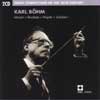Great Conductors of the 20th Century - Karl Böhm
A mixed trio of recordings featuring the great Austrian conductor
View record and artist detailsRecord and Artist Details
Composer or Director: Gustav Mahler, Richard Strauss, Wolfgang Amadeus Mozart
Genre:
Orchestral
Label: Orfeo d'or
Magazine Review Date: 3/2004
Media Format: CD or Download
Media Runtime: 71
Mastering:
Stereo
DDD
ADD
Catalogue Number: C607031B

Tracks:
| Composition | Artist Credit |
|---|---|
| Symphony No. 29 |
Wolfgang Amadeus Mozart, Composer
Karl Böhm, Conductor Sächsische Staatskapelle Dresden Wolfgang Amadeus Mozart, Composer |
| Kindertotenlieder |
Gustav Mahler, Composer
Christa Ludwig, Mezzo soprano Gustav Mahler, Composer Karl Böhm, Conductor Sächsische Staatskapelle Dresden |
| Tod und Verklärung |
Richard Strauss, Composer
Karl Böhm, Conductor Richard Strauss, Composer Sächsische Staatskapelle Dresden |
Composer or Director: Ludwig van Beethoven, Pyotr Ilyich Tchaikovsky
Genre:
Orchestral
Label: Orfeo d'or
Magazine Review Date: 3/2004
Media Format: CD or Download
Media Runtime: 84
Mastering:
Stereo
ADD
Catalogue Number: C608032B

Tracks:
| Composition | Artist Credit |
|---|---|
| Concerto for Piano and Orchestra No. 5, 'Emperor' |
Ludwig van Beethoven, Composer
Czech Philharmonic Orchestra Emil Gilels, Piano Karl Böhm, Conductor Ludwig van Beethoven, Composer |
| Symphony No. 4 |
Pyotr Ilyich Tchaikovsky, Composer
Czech Philharmonic Orchestra Karl Böhm, Conductor Pyotr Ilyich Tchaikovsky, Composer |
Composer or Director: Joseph Haydn, Franz Schubert, Anton Bruckner, Wolfgang Amadeus Mozart
Genre:
Orchestral
Label: Great Conductors of the 20th century
Magazine Review Date: 3/2004
Media Format: CD or Download
Media Runtime: 156
Mastering:
Stereo
ADD
Catalogue Number: 575944-2

Tracks:
| Composition | Artist Credit |
|---|---|
| Così fan tutte, Movement: Overture |
Wolfgang Amadeus Mozart, Composer
Karl Böhm, Conductor Philharmonia Orchestra Wolfgang Amadeus Mozart, Composer |
| Symphony No. 8 |
Anton Bruckner, Composer
Anton Bruckner, Composer Cologne Radio Symphony Orchestra Karl Böhm, Conductor |
| Symphony No. 91 |
Joseph Haydn, Composer
Joseph Haydn, Composer Karl Böhm, Conductor Vienna Philharmonic Orchestra |
| Symphony No. 9, 'Great' |
Franz Schubert, Composer
Franz Schubert, Composer Karl Böhm, Conductor Staatskapelle Dresden |
Author: Richard Osborne
The Orfeo disc also gives us the rest of the Assumption Day concert: a movingly articulated account of Mahler’s Kindertotenlieder with Christa Ludwig as soloist and, to begin with, what was probably Böhm’s favourite Mozart symphony, No 29 in A. The Dresden strings glow like old gold and though Böhm’s tempi are measured, the music-making never lacks impulse. Were it not for a pair of over-reticent horns, this would be more than a match for either of Böhm’s studio recordings.
Böhm was one of a surprisingly small band of conductors – Sir Adrian Boult was another – who always conducted Schubert’s Great C major Symphony well and often conducted it superbly. Two Böhm recordings were issued commercially: his now legendary 1963 Berlin account and a live concert performance recorded in Dresden in 1979 when he was 84. It is the later performance which DG has leased to EMI for its Great Conductors of the 20th Century issue. Orchestrally, it is not in the same league as the Berlin version (the Dresden woodwinds, the clarinets particularly, are disappointingly thin-toned). As a reading, it is less moulded, more classically direct, notwithstanding an astonishingly grandiose close to the first movement.
Curiously, Böhm made no Haydn symphony recordings until 1972 when he recorded Symphonies Nos 88-92 with the Vienna Philharmonic. The performance of Symphony No 91, which precedes the Schubert in the Great Conductors anthology, is earthy and amusing with a wonderfully droll account of the Andante and a fine, strutting Menuet. This is Haydn as Beecham used to conduct him.
The first disc in the Great Conductors set is largely given over to a Cologne Radio studio performance of Bruckner’s Eighth Symphony. It is a thoroughly professional affair technically, orchestrally and interpretatively, but its inclusion smacks more of expediency than a desire to explain further the idea of Böhm the ‘great’ conductor. It is an unremittingly urgent performance in which Böhm – fully engaged and clearly earning his no doubt not inconsiderable fee – conjures forth some electrifying climaxes. Yet there is urgency and urgency. Compare Böhm and Barbirolli in this music. Where Barbirolli is emotionally driven, Böhm is more like a man going from A to B.
Böhm’s trick where this kind of symphonic repertory was concerned seems to have been to mix orchestral discipline with rhythmic energy and a dash of theatricality. This is what we have on the second on these Salzburg concerts which ends with a ferociously intense account of Tchaikovsky’s Fourth Symphony. The Czech Philharmonic playing is not quite in the same league as that of the LSO on Böhm’s later studio recording (DG, 1/79 – nla) but the performance holds together better and achieves moments of real incandescence. What it again lacks is a sense of inner imagination, particularly at points of transition – the hallmark of rival readings by such distinguished contemporaries as Beecham, Furtwängler and Karajan.
Emil Gilels is the soloist in the Beethoven Emperor Concerto which precedes the Tchaikovsky. Wonderful as it would be to have a truly memorable account of this concerto from Gilels, this is not it. True, it is better than the disastrous live 1958 Prague recording (Multisonic, 4/93) where Gilels seems somewhat the worse for wear. It is also marginally more alive than either of his studio recordings. On the other hand, it is not as good as his Leningrad Philharmonic performance with Sanderling (Melodiya, nla).
Why this should be is partly explained by the rehearsal sequence which Orfeo has added to compensate for the fact that the concerto and symphony can’t quite be fitted onto a single CD. What we hear is a largely uneventful play-through of the slow movement and finale which, once we are past the orchestral introduction, mostly consists of Gilels leading the players through the music in a slightly bored and occasionally slapdash manner with Böhm muttering instructions over the music as they go.
The booklet includes no English-language paraphrase of Böhm’s chunterings, nor are texts or translations provided for Kindertotenlieder.
Discover the world's largest classical music catalogue with Presto Music.

Gramophone Digital Club
- Digital Edition
- Digital Archive
- Reviews Database
- Full website access
From £8.75 / month
Subscribe
Gramophone Full Club
- Print Edition
- Digital Edition
- Digital Archive
- Reviews Database
- Full website access
From £11.00 / month
Subscribe
If you are a library, university or other organisation that would be interested in an institutional subscription to Gramophone please click here for further information.




